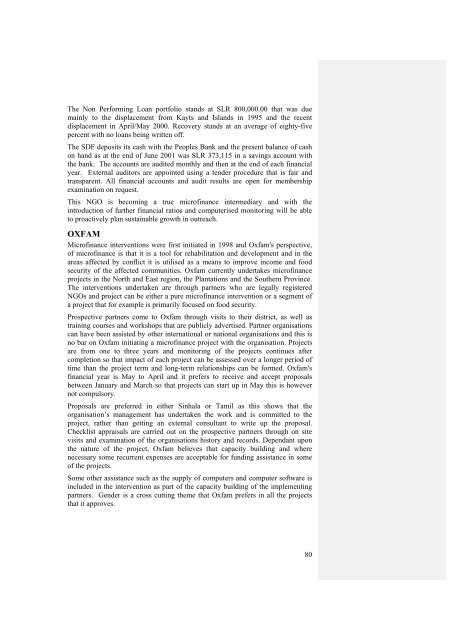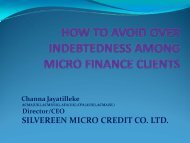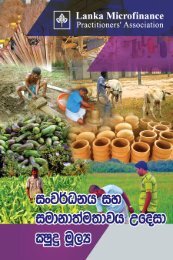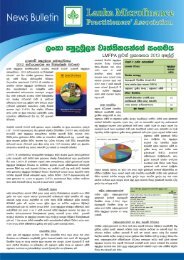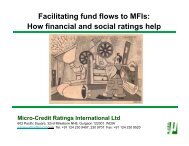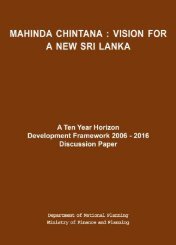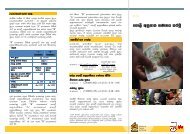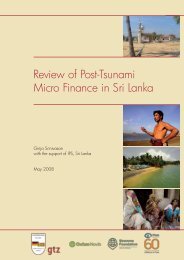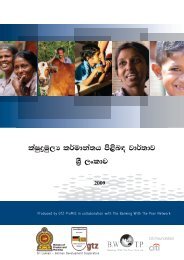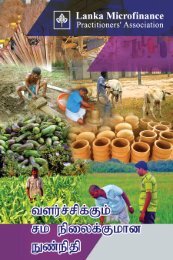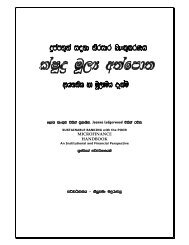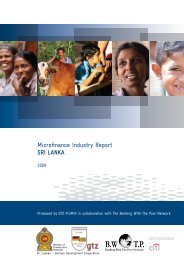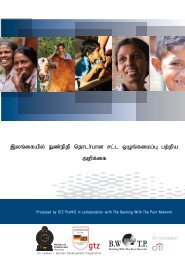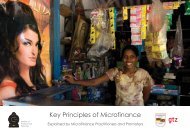National Microfinance Study of Sri Lanka: Survey of Practices and ...
National Microfinance Study of Sri Lanka: Survey of Practices and ...
National Microfinance Study of Sri Lanka: Survey of Practices and ...
Create successful ePaper yourself
Turn your PDF publications into a flip-book with our unique Google optimized e-Paper software.
The Non Performing Loan portfolio st<strong>and</strong>s at SLR 800,000.00 that was due<br />
mainly to the displacement from Kayts <strong>and</strong> Isl<strong>and</strong>s in 1995 <strong>and</strong> the recent<br />
displacement in April/May 2000. Recovery st<strong>and</strong>s at an average <strong>of</strong> eighty-five<br />
percent with no loans being written <strong>of</strong>f.<br />
The SDF deposits its cash with the Peoples Bank <strong>and</strong> the present balance <strong>of</strong> cash<br />
on h<strong>and</strong> as at the end <strong>of</strong> June 2001 was SLR 373,115 in a savings account with<br />
the bank. The accounts are audited monthly <strong>and</strong> then at the end <strong>of</strong> each financial<br />
year. External auditors are appointed using a tender procedure that is fair <strong>and</strong><br />
transparent. All financial accounts <strong>and</strong> audit results are open for membership<br />
examination on request.<br />
This NGO is becoming a true micr<strong>of</strong>inance intermediary <strong>and</strong> with the<br />
introduction <strong>of</strong> further financial ratios <strong>and</strong> computerised monitoring will be able<br />
to proactively plan sustainable growth in outreach.<br />
OXFAM<br />
<strong>Micr<strong>of</strong>inance</strong> interventions were first initiated in 1998 <strong>and</strong> Oxfam's perspective,<br />
<strong>of</strong> micr<strong>of</strong>inance is that it is a tool for rehabilitation <strong>and</strong> development <strong>and</strong> in the<br />
areas affected by conflict it is utilised as a means to improve income <strong>and</strong> food<br />
security <strong>of</strong> the affected communities. Oxfam currently undertakes micr<strong>of</strong>inance<br />
projects in the North <strong>and</strong> East region, the Plantations <strong>and</strong> the Southern Province.<br />
The interventions undertaken are through partners who are legally registered<br />
NGOs <strong>and</strong> project can be either a pure micr<strong>of</strong>inance intervention or a segment <strong>of</strong><br />
a project that for example is primarily focused on food security.<br />
Prospective partners come to Oxfam through visits to their district, as well as<br />
training courses <strong>and</strong> workshops that are publicly advertised. Partner organisations<br />
can have been assisted by other international or national organisations <strong>and</strong> this is<br />
no bar on Oxfam initiating a micr<strong>of</strong>inance project with the organisation. Projects<br />
are from one to three years <strong>and</strong> monitoring <strong>of</strong> the projects continues after<br />
completion so that impact <strong>of</strong> each project can be assessed over a longer period <strong>of</strong><br />
time than the project term <strong>and</strong> long-term relationships can be formed. Oxfam's<br />
financial year is May to April <strong>and</strong> it prefers to receive <strong>and</strong> accept proposals<br />
between January <strong>and</strong> March so that projects can start up in May this is however<br />
not compulsory.<br />
Proposals are preferred in either Sinhala or Tamil as this shows that the<br />
organisation’s management has undertaken the work <strong>and</strong> is committed to the<br />
project, rather than getting an external consultant to write up the proposal.<br />
Checklist appraisals are carried out on the prospective partners through on site<br />
visits <strong>and</strong> examination <strong>of</strong> the organisations history <strong>and</strong> records. Dependant upon<br />
the nature <strong>of</strong> the project, Oxfam believes that capacity building <strong>and</strong> where<br />
necessary some recurrent expenses are acceptable for funding assistance in some<br />
<strong>of</strong> the projects.<br />
Some other assistance such as the supply <strong>of</strong> computers <strong>and</strong> computer s<strong>of</strong>tware is<br />
included in the intervention as part <strong>of</strong> the capacity building <strong>of</strong> the implementing<br />
partners. Gender is a cross cutting theme that Oxfam prefers in all the projects<br />
that it approves.<br />
80


